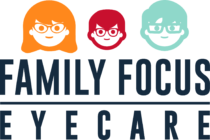Being nearsighted or farsighted can cause your vision to appear blurry near or far away, depending on your prescription. These conditions will have different effects on your vision. If you are nearsighted, it means you can see objects close by clearly, but objects at a distance or further away appear blurry. If you are farsighted, you will be able to see objects clearly in the distance, but objects closer to you appear blurry.
These are common vision conditions that many people have. Both of these vision conditions are caused by refractive errors, which happen when the shape of your eye keeps the light from focusing properly. This causes the retina, the light-sensitive area at the back of your eye, to produce an unclear image.
Over 150 million Americans experience refractive errors and are unaware of them. Many do not realize that they can be seeing better and that if their vision is impacted in any way, they should let their doctor know. It is important to keep regular appointments with your eye doctor so they can diagnose your condition early and help treat your symptoms.
What Are Some Symptoms of These Conditions?
For many, there can be small changes in vision over time. These changes could be a sign of the early stages of a deteriorating condition. Some of the symptoms and signs you could have a refractive error are:
- Hazy or double vision
- Squinting
- Headaches
- Seeing a halo or glare around bright lights
- Eye strain
- Trouble focusing when you are looking at a screen or reading
Many of these symptoms could develop over time, but some could come on suddenly. Should you develop other symptoms, it could mean that you have another condition and you should speak to your eye doctor about it.
Sometimes, it can be hard to notice the subtle signs or small changes in your vision. Other conditions have similar symptoms that could mimic refractive errors. Many of us are in front of a screen for many hours a day, whether it is a computer, cell phone, or tablet, and this can cause digital eye strain. Digital eye strain may cause you to think there are changes in your vision, but these could be temporary.
If you are nearsighted, this is usually a result of the eye being oval-shaped or too long. Another cause could be the result of the cornea being too steep. When you are farsighted, it usually means your cornea is too curved or your eye is too short. This is the opposite of being nearsighted.
When you have symptoms that last for long periods of time, being aware of potential causes may be helpful when discussing them with your eye doctor. If your sight begins to impact normal daily activities, this should be brought to the attention of your doctor. Being nearsighted or farsighted can be treated.
How Can I Treat My Near or Farsightedness?
There are many ways your eye doctor can treat or correct vision conditions. With refractive errors, one of the most commonly recommended forms of treatment is to use prescription lenses. Over time, your prescription could change. You might notice, over time, you are developing symptoms again. This could mean that your eyes have changed and you may need an updated prescription.
Other types of treatments for both nearsightedness and farsightedness include contact lenses that work similarly to prescription glasses. Over time, the prescription for these may need to change as well. Laser eye surgery is another treatment you may consider. Depending on how severe your condition is, you and your eye doctor can discuss which is the best treatment for you.
Eye Exams Test for Nearsightedness & Farsightedness
To test if you are nearsighted or farsighted, your eye doctor will perform a routine eye exam. These regular checkups can detect which condition you could have. It is helpful to give your eye doctor as much information as you can and let them know any concerns that you have about your vision. The doctors at all locations of Family Focus Eyecare are here to help you with any questions that you might have. Whether you need to book your next appointment or have questions about eye health or symptoms, we are here to help. We look forward to seeing you.



